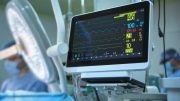With this week (16th November – 22nd November) marking the annual AF Awareness Week, there’s never been a better time to bring attention to the most common arrhythmia, Atrial Fibrillation or AF, which could impact any one of us, regardless of age or gender.
Around 1.2 million people in the UK are currently registered with AF (Atrial Fibrillation) – a condition that increases a patient’s stroke risk by five times and contributes to just under one in five strokes in the UK. Research has found that those suffering with a stroke caused by this condition are twice as likely to die and 3x more likely to become disabled.
What makes AF even more serious is the fact that it is so often missed, with around half a million people in the UK undiagnosed according to some estimations. This number is only increasing thanks to the current pandemic – as non-essential appointments are put on hold and individuals try to avoid putting additional pressures on NHS resources.
“AF is the most common heart rhythm abnormality and can have significant consequences, such as stroke.” comments Dr. Mickey Jachuck, Clinical Director and Cardiologist, South Tyneside & Sunderland Trust. “Many patients are asymptomatic and unaware that they might have developed AF, so diagnosis is often reliant on opportunistic pulse checks and incidental discovery when patients are being assessed for other conditions. We recognise that some groups are at a higher risk of developing AF, so targeting these patients for more detailed assessment is important to improve our ability to diagnose, and therefore treat, them earlier in order to prevent complications.”
Redefining the way cardiac arrhythmias, such as AF, are clinically diagnosed
A world first, iRhythm’s Zio patch-like solution – which is underpinned by artificial intelligence – detects arrhythmias at the first time of asking, giving almost complete certainty in a single test. It’s small and comfortable, enabling the patient to wear it consistently over the recommended time period. Above all, it’s fast; in the amount of time it can now take people to get a GP appointment, iRhythm technology can detect and diagnose any potential forms of arrhythmia.
In September, iRhythm was named a winner of the UK government’s AI in Health and Care Award. A competitive process run by the AAC as part of the NHS AI Lab, the award aims to benefit patients by combining the power of artificial intelligence with the expertise of the NHS. iRhythm will utilise the funding to trial the Zio service in selected sites – comprising trusts, CCG’s and networks – across the UK, helping to bring AI-led technologies to a greater number of people.
“While Holter monitoring has been around for many years and has been the first-choice investigation for assessing patients with suspected AF, it does have limitations in terms of compliance and technical quality. Leads can fall off resulting in loss of data collection, and the patient is very restricted whilst wearing the monitor in terms of the activities they can and cannot do.” continues Jachuck.
“The Zio patch offers high-quality, continuous ambulatory ECG monitoring for up to two-weeks and is much less restrictive than Holter monitoring. The process is very simple, and the data capture is much more complete and less prone to technical issues. Results are processed swiftly and accurately, and the diagnostic yield is much greater in comparison with conventional investigations.”
Living with AF
Nigel first experienced the symptoms of Atrial Fibrillation early in 2015. Medication initially re-established sinus rhythm but towards the end of 2016 AF had reasserted itself and he underwent a successful cardiac ablation. Since then, he has been able to manage the condition fairly well. However, this year he suffered an episode during the summer lockdown (at the age of 66).
“I first noticed that my pulse was not regular in January 2015 and, encouraged by my wife, I went to my GP to seek his advice. This led to my first AF diagnosis.
“When symptoms resurfaced earlier this year, they manifested themselves as a ‘thumping’ feeling in my heart. I thought diagnosis might be a little more difficult to access, given we were in the midst of a global pandemic. However, having already experienced AF once, I knew how serious the condition could be if left undiagnosed and untreated.
“My doctor recommended iRhythm’s Zio service. I’d used traditional Holter devices previously which were both uncomfortable and impractical – not even enabling you to tuck your shirt in when wearing them! Zio was a totally different experience, enabling me to continue to live my life and carry on with everyday tasks without any disruption whatsoever. It was easy to apply and, after wearing it for a week, I simply posted it back to my doctor in order to receive a diagnosis. It was a very straight-forward process after that. The Zio patch showed that my symptoms were being caused by an increased frequency of ectopic ventricular beats and not by AF as I had thought. My doctor recommended beta-blockers and since taking them, my condition has stabilized and is under control once again.
“For many, heart conditions can be a very frightening concept. So much so, that some individuals might put off visiting a doctor, choosing to ignore the problem instead. Perhaps the thought of a long, emotional road between first experiencing the symptoms and having a definite diagnosis is too much to consider. However, AF is treatable – I’m the evidence of that. Diagnosis doesn’t have to be a long, painful process and it definitely shouldn’t put people off seeking help. I’d urge anyone who might have an inkling that something is wrong – no matter how minor the symptoms – to reach out. For me, receiving a diagnosis so quickly and efficiently was a huge relief and the first step to getting back on track.”
Symptoms of Atrial Fibrillation
Dr. Joe Mills, Cardiologist, Liverpool Heart & Chest Hospital, outlines what AF means for patients; “Symptoms of AF may be quite non-specific and can include generalised fatigue, palpitations and shortness of breath. Classically, particularly if AF episodes are occurring intermittently, then these can cause an awareness of the heart beating rapidly and erratically. Persistent or continuous AF can be present without any symptoms present whatsoever, which is why all patients with risk factors such as hypertension, diabetes, heart failure, heart valve disease and/or age of 65 or more, should have their pulse checked annually.
“Atrial Fibrillation remains undiagnosed because it is often present without disabling symptoms and therefore the pulse is not checked and no ECG performed. It can also be difficult to diagnose if it only occurs sporadically – capturing the heart rhythm during an episode can be very challenging. Better education amongst the public and the wider healthcare community would also help – perhaps enabling dentists, opticians, pharmacists to have the ability to perform opportunistic screening may help identify the condition.
“Zio, and other ECG-patch technologies, represent a sea-change in how people can have their heart rhythm monitored. Zio fits perfectly with the “NHS@home” strategy – direct interaction with healthcare professionals is not required at any stage as the whole process can be managed via a virtual consultation and the postal service. Zio provides greater diagnostic yield and longer duration of continuous ECG monitoring (up to 14 days) and is so unobtrusive that it allows monitoring to performed whilst normal day-to-day activities are being performed.
“The overall cost to the NHS of delivering heart monitoring services could be significantly reduced by using Zio, as the pathway is streamlined and a diagnosis can be made more quickly therefore avoiding repeat tests and enhancing patient care.”
AF Awareness Week
“This year’s AF Awareness Week is more significant than ever before. Against the backdrop of the ongoing health crisis, many individuals have, understandably, been delaying seeking medical advice due to exposure concerns”, comments Justin Hall, Vice President EMEA and General Manager UK, iRhythm.
“However, when it comes to serious heart conditions, such as Atrial Fibrillation, the key to improving patient outcomes is through earlier and more accurate diagnosis. As with many cardiac-related conditions, the timeliness of a diagnosis is essential. The sooner AF is diagnosed; the sooner medical practitioners can decide on the best course of treatment.
“This is something that intelligent technologies – such as Zio – can help to achieve. By providing uninterrupted, comprehensive monitoring of a patient’s heart, these technologies have the power to redefine how serious illnesses are clinically assessed and therefore treated.
“These technologies can even help in the current climate. For example, many providers have changed the way that they deliver their services in order to ensure that patients can still access them, even during a national lockdown. For some, this has meant launching direct to patient shipping models – enabling those who are most vulnerable to still access the care that they need without leaving their homes. By helping to minimise any interaction between patients and healthcare staff, whilst still producing accurate reports, self-application diagnostic tools have proven to be very successful, keeping all parties safe, while also reducing some of the strain being placed on other healthcare resources.
“Although COVID-19 is a huge focus at the moment, we still need to find ways to ensure that individuals suffering with other serious conditions can access the healthcare they need.”





